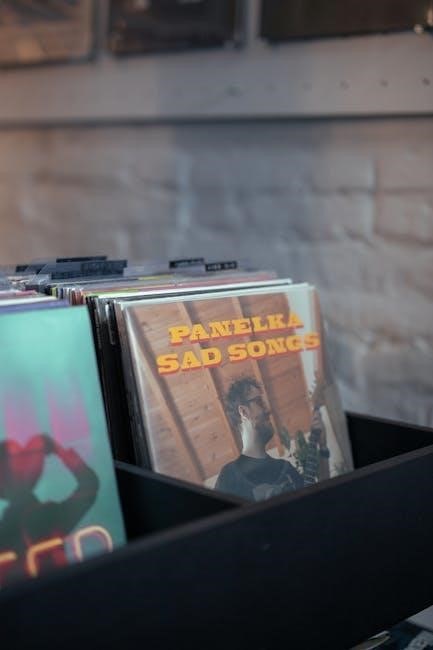The East Lindsey Bin Collection Calendar 2023 PDF is a comprehensive guide for residents, providing personalized collection dates and essential information on waste management services․
1․1 Overview of the Calendar
The East Lindsey Bin Collection Calendar 2023 PDF is a detailed yearly guide outlining waste collection schedules for residents in the East Lindsey district․ It provides month-by-month and week-by-week collection dates for household waste, recycling, and garden waste․ The calendar is designed to help residents stay informed about their specific bin collection days, ensuring efficient waste management․ It also highlights key dates, such as bank holidays and Christmas collections, which may affect regular schedules․ Additionally, the calendar includes information on how extreme weather conditions might impact collections․ This resource is essential for residents to plan and manage their waste effectively throughout the year․
1․2 Importance of the Bin Collection Schedule
The East Lindsey Bin Collection Schedule is crucial for maintaining a clean and environmentally friendly community․ By adhering to the set dates, residents can ensure timely waste disposal, reducing litter and potential health risks․ Proper recycling practices, guided by the schedule, help conserve resources and lower environmental impact․ Additionally, the schedule aids the council in efficiently managing waste services, preventing missed collections and disruptions․ Staying informed through the calendar helps residents contribute to a sustainable and orderly waste management system, benefiting both the community and the environment․

How to Access the East Lindsey Bin Collection Calendar 2023 PDF
Visit the East Lindsey District Council’s official website and navigate to the waste management section․ Use the postcode finder tool for personalized dates and download the 2023 PDF calendar for easy reference․
2․1 Downloading the Calendar from the Official Website
To access the East Lindsey Bin Collection Calendar 2023 PDF, visit the official East Lindsey District Council website․ Navigate to the waste management section, where you’ll find a dedicated page for bin collection schedules․
Once there, enter your postcode using the provided tool to retrieve your personalized collection dates․ The PDF calendar is available for download, offering a clear overview of collection schedules, including household waste, recycling, and garden waste dates․
The calendar also includes key information such as holiday collections and special instructions for extreme weather conditions, ensuring residents stay informed about their waste management responsibilities throughout the year․
2․2 Using the Postcode Finder Tool for Personalized Collection Dates
The Postcode Finder Tool on the East Lindsey District Council website allows residents to quickly determine their bin collection dates․ By entering your postcode, you can access a detailed schedule tailored to your address, ensuring you never miss a collection․
This tool provides specific dates for household waste, recycling, and garden waste collections, making it easy to plan and stay organized․ It also includes alerts for changes due to holidays or extreme weather, keeping you informed about any disruptions to the service․
With this feature, residents can efficiently manage their waste disposal and contribute to maintaining a clean and sustainable community environment․

Types of Bin Collections in East Lindsey
East Lindsey operates three main bin collection services: household waste (black bin), recycling (grey bin), and garden waste (green bin), each collected on a fortnightly schedule․
3․1 Household Waste (Black Bin)
The black bin is designated for household waste, including general rubbish such as food scraps, packaging, and non-recyclable items․ Collections occur every two weeks, ensuring consistent waste management․ Residents can check specific dates via the East Lindsey postcode finder tool or the official calendar․ Proper segregation of waste is crucial to maintain efficiency․ Extreme weather may occasionally disrupt schedules, so it’s advisable to monitor updates from the council․ This service is essential for maintaining cleanliness and hygiene in the community, aligning with East Lindsey’s commitment to effective waste management․ Always refer to the official sources for the most accurate information․
3․2 Recycling Waste (Grey Bin)
The grey bin is for recyclable materials such as paper, plastic, glass, and metal․ Collections are fortnightly, alternating with household waste․ Residents can verify dates using the East Lindsey District Council’s postcode tool or the 2023 PDF calendar․ Proper sorting of recyclables is vital to ensure materials are processed correctly․ Contaminated items may not be collected․ During extreme weather, collections might be delayed, so residents should monitor council updates․ Recycling helps conserve resources and reduces landfill use, supporting environmental sustainability․ For detailed guidelines, visit the council’s website or refer to the provided calendar․ Always check for specific items accepted in your area․
3․3 Garden Waste (Green Bin)
The green bin is designated for garden waste, including grass cuttings, leaves, and small branches․ Collections occur seasonally, typically from spring to autumn, every two weeks․ Residents must subscribe to this service, which incurs a small fee․ The garden waste collection schedule is divided into two alternating weeks to ensure efficient service across the district․ During extreme weather, collections may be postponed, and residents are advised to check the council’s website for updates․ Properly managing garden waste helps reduce landfill use and supports composting efforts․ For specific dates, refer to the East Lindsey Bin Collection Calendar 2023 PDF or use the postcode finder tool․ Always ensure materials are correctly sorted to avoid collection issues․

Special Collections and Key Dates
The East Lindsey Bin Collection Calendar 2023 PDF highlights special collections, including Christmas and New Year schedules, ensuring residents stay informed about festive period waste management․
4․1 Christmas and New Year Collection Schedule
The East Lindsey Bin Collection Calendar 2023 PDF includes a detailed schedule for Christmas and New Year collections, ensuring residents are prepared for festive period waste management․ Key dates are highlighted, with adjustments made for bank holidays․ Residents are advised to check the calendar for specific changes, as collections may be rescheduled due to holiday closures․ Additionally, the calendar provides guidance on bin placement during extreme weather conditions, such as snow or ice, which may disrupt services․ Downloading the PDF ensures residents have access to all necessary information for seamless waste management during the festive season․
Impact of Extreme Weather on Bin Collections
Extreme weather may disrupt bin collections․ Residents are advised to leave bins at the boundary and check the calendar for updated schedules during such conditions․
5․1 What to Do if Your Bin Collection is Disrupted
If your bin collection is disrupted due to extreme weather, leave your bins at the boundary of your property․ Check the East Lindsey District Council website for updates or revised schedules․ Use the postcode finder tool to confirm collection dates․ If collections are postponed, bins will be collected as soon as it is safe․ Keep an eye on official communications for any changes․ If issues persist, contact the council directly for assistance․ This ensures waste management remains efficient and convenient for all residents․
Frequency of Bin Collections
East Lindsey District Council operates a fortnightly bin collection service for household waste, recycling, and garden waste․ Household waste (black bin) and recycling waste (grey bin) are collected every two weeks․ Garden waste (green bin) collections are also fortnightly but split into two schedules: week 1 and week 2․ Residents can check their specific collection dates using the postcode finder tool or by downloading the East Lindsey Bin Collection Calendar 2023 PDF․ This frequency ensures regular waste management while maintaining efficiency across the district․
Contacting East Lindsey District Council for Bin-Related Queries
Residents can contact East Lindsey District Council via their official website or postcode finder tool for bin-related queries, including missed collections and service requests․
7․1 Reporting Missed Bin Collections
To report a missed bin collection in East Lindsey, residents can use the East Lindsey District Council website․ Visit the official portal, enter your postcode, and access the reporting tool․ Provide details such as bin type and address․ Ensure bins remain at the boundary for collection․ If issues persist, contact the council directly via phone or email for further assistance․ This streamlined process helps resolve collection disruptions efficiently, ensuring waste management remains seamless for all residents․ Timely reporting helps maintain community cleanliness and adherence to waste schedules․ Always follow the council’s guidelines for proper resolution․
7․2 Requesting Additional Bin Services
Residents in East Lindsey can request additional bin services through the East Lindsey District Council website․ Visit the official portal and navigate to the waste management section․ Complete the online form, specifying the type of bin required and your address․ The council will review your request and provide the necessary bins, ensuring your waste management needs are met․ For further assistance, contact the council directly via phone or email․ This service aims to support residents in maintaining proper waste disposal and recycling practices efficiently․

Environmental Impact and Waste Management
The Energy from Waste (EfW) plant in Lincolnshire treats 190,000 tonnes of residual waste annually, generating 105,000 MWh of electricity and reducing landfill dependency significantly․
8․1 Energy from Waste (EfW) Plant in Lincolnshire
The Energy from Waste (EfW) plant in Lincolnshire plays a crucial role in managing residual waste, treating up to 190,000 tonnes annually․ Operational since March 2014, it converts non-recyclable waste into electricity, producing 105,000 MWh each year․ This facility significantly reduces landfill dependency, ensuring a more sustainable approach to waste disposal․ By diverting waste away from landfills, the EfW plant contributes to lowering greenhouse gas emissions and supports Lincolnshire’s environmental goals, aligning with broader strategies to combat climate change and promote renewable energy sources․